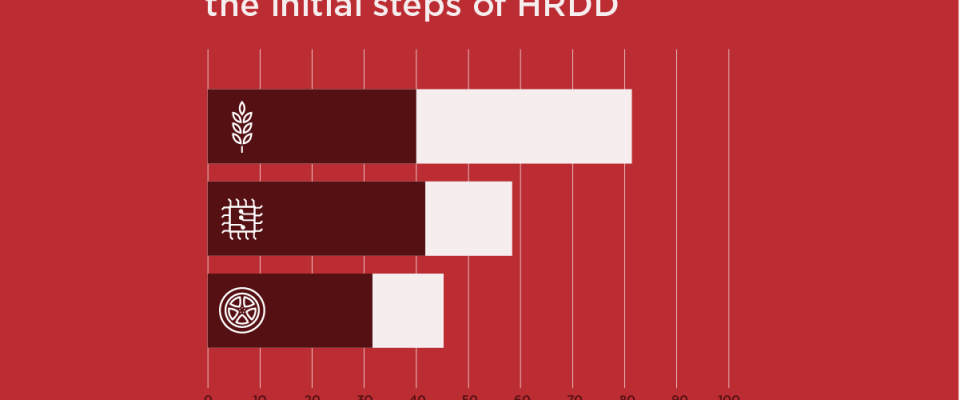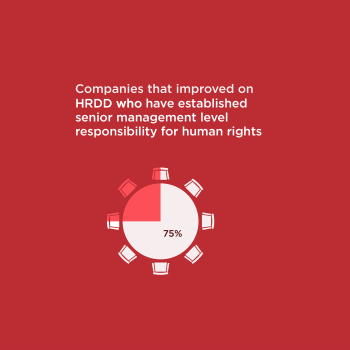Key finding
Corporate respect for human rights has gained momentum – the stage is set for regulation to speed things up

Corporate respect for human rights has gained momentum – the stage is set for regulation to speed things up and close gaps of inaction
In 2011, the United Nations Guiding Principles established the responsibility of businesses to respect human rights. Since then, organisations and individuals from all stakeholder groups – civil society organisations, human rights defenders, workers, financial institutions, academics, business platforms, multilateral organisations and, of course, many companies themselves – have worked tirelessly to ensure this responsibility is enshrined in companies’ operations. Eleven years and five iterations of the Corporate Human Rights Benchmark later, our data shows that momentum is building.
Since the first iteration of the Corporate Human Rights Benchmark was published in 2017, we have seen clear company progress. Over the years, the share of companies scoring zero on key human rights indicators, such as commitments to human rights (A.1.1), the first steps of an human rights due diligence process (B.2.1-B.2.3) and establishing grievance mechanisms for workers and external individuals (C.1, C.2), has decreased. In other words, companies are taking more action on human rights.
Food and agriculture companies were assessed for the fifth time this year, ICT companies for the third time and automotive companies for the second time. Despite methodology changes that raised the bar in terms of requirements, 66% of food and agriculture companies, 65% of ICT companies and 57% of automotive companies have improved their scores on key human rights indicators since their inclusion in the benchmark.
We have seen companies like Corning and General Motors stepping up their human rights efforts, consequently moving up the rankings and significantly increasing their scores, particularly on due diligence. At the same time, on average, company score improvements are low, reflected in the fact that 82% of companies still score in the lowest three score bands (below 30%) in the benchmark. In the decade since the United Nations Guiding Principles were endorsed, the pace at which companies are improving on these key aspects of respecting human rights is simply too slow, and it is clear that embedding human rights within companies remains a major challenge.
However, the fact that most companies have improved their scores between the 2017 and 2022 CHRB iterations indicates that there is clear momentum for corporate respect for human rights.
Regulatory action could provide the much-needed final push for companies to move more rapidly towards respecting the human rights of all affected stakeholders. Through regulatory initiatives – such as the EU Corporate Sustainability Due Diligence Directive (CS3D) and the Corporate Sustainability Reporting Directive (CSRD) as well as the Japanese government’s recent commitment to develop legislation on HRDD – governments have the opportunity to raise the bar. They could create a level playing field and mandate effective corporate respect for human rights to ensure that it is not a nice-to-have, but a must-have for all companies.
